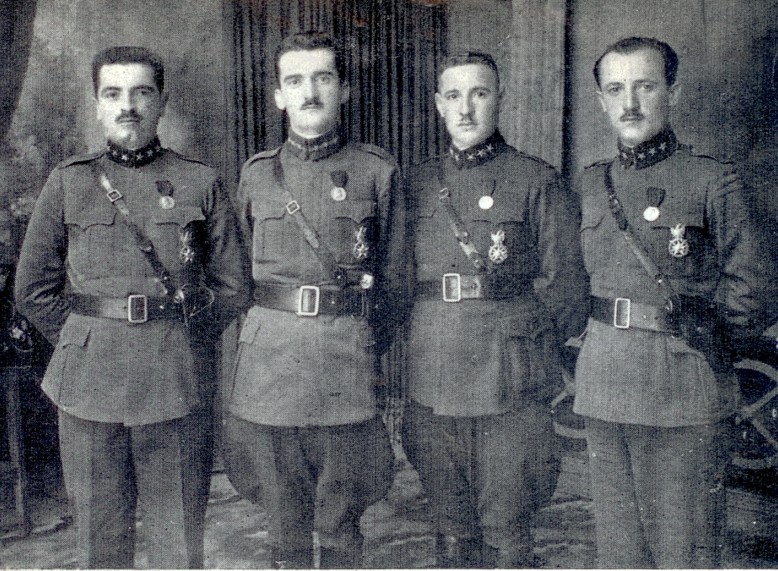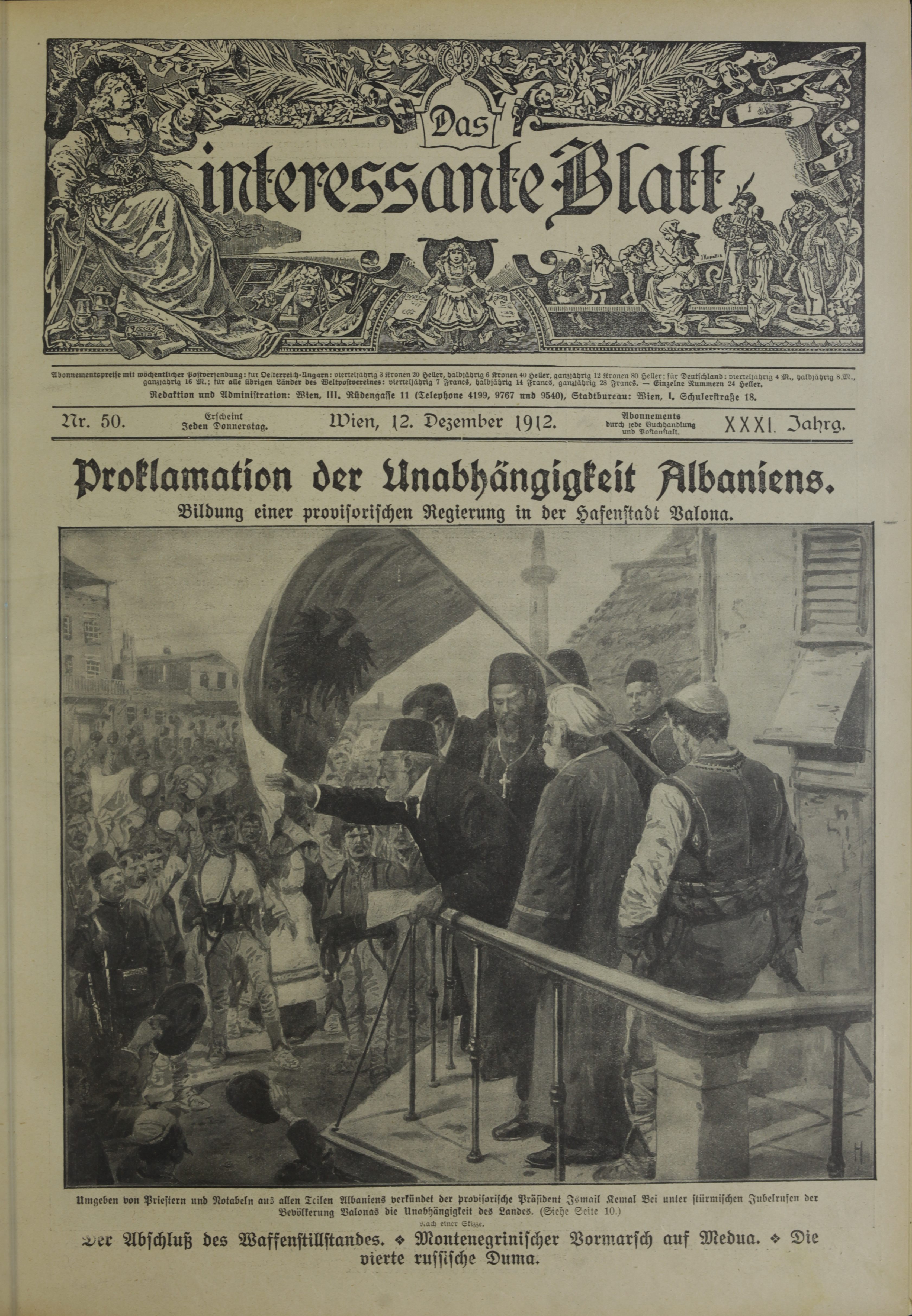|
Prenk Pervizi
Prenk Pervizi (4 May 1897 – 6 September 1977) was an Albanian military figure, General of the Albanian army, who also served as Minister of Defence for a short period during World War II. Pervizi attended the Military Academy in Vienna, Austria, from 1914 to 1918, and later in Torino, 1930–1933. As a military figure, he was a protagonist in the foreground of Albanian history in the years between 1918 and 1944. Friend and right-hand man of King Zog, he remained loyal from the beginning to the end to him and the Albanian Kingdom, 1928–1939. During World War II he was involved in military operations. Recruited by the Italians and sent to the first line of combat, he came into conflict with them, withdrawing the Albanian troops from the Greco-Italian War. He also opposed the German SS troops recruitment process in Albania. Bitter opponent of the communists, after failed attempts to engage some serious support from the British emissaries, he was forced to exile, first in Greece ... [...More Info...] [...Related Items...] OR: [Wikipedia] [Google] [Baidu] |
Albanian Kingdom (1928–39) — from the House of Wied
{{disambiguation ...
Kingdom of Albania may refer to: *Kingdom of Albania (medieval) — from the Capetian House of Anjou *Albanian Kingdom (1928–1939) — from the House of Zogu *Albanian Kingdom (1939–1943) — from the House of Savoy during the Italian occupation *Albanian Kingdom (1943–1944) — during the German occupation See also *Principality of Arbanon *Principality of Albania (medieval) — from the House of Thopia and the House of Balsha *Principality of Albania The Principality of Albania ( al, Principata e Shqipërisë or ) refers to the short-lived monarchy in Albania, headed by Wilhelm, Prince of Albania, that lasted from the Treaty of London of 1913 which ended the First Balkan War, through ... [...More Info...] [...Related Items...] OR: [Wikipedia] [Google] [Baidu] |
Prenk Jaku
Prenk, also prënk, prek is Albanian language title of the chieftain of Catholic Mirdite clan and also a given name. In the 19th century it was hereditary position of the heads of Gjomarkaj family who had the official title of prenk paşa ( en, Prince Lord). Members of this clan lived on the territory of the Sanjak of Shkoder and their chieftain was obliged to provide 5,000 troops to Ottomans upon notice. It is used by Catholic Albanians of all regions. According to one 19th-century travel account Prenk was corruption of Peter that "from time immemorial has been the first baptismal name of nearly all chiefs of this tribe". List of notable people with this title includes: * Prenk Bib Doda, Mirdita clan leader, politician * Prenk Doçi, Albanian Rilindas * Prenk Pervizi, military figure of 20th century * Prenk Cali, Kelmendi warlord References {{Reflist Albanian noble titles ... [...More Info...] [...Related Items...] OR: [Wikipedia] [Google] [Baidu] |
Elez Isufi
Elez Isufi (1861 – 29 December 1924) was an Albanian nationalist figure and guerrilla fighter. Biography Elez Isufi was born in the village of Sllovë in the Dibër region, was son of Isuf Ndreu. He and his guerrilla band resisted Serb forces in 1912. A close ally of Bajram Curri, Isufi led an uprising in Dibra on 15 August 1921 to free the region from Serb forces. The fighting continued up to December 1921. He was involved in a further uprising on 1 March 1922 against the regime of Ahmet Zogu, and his Dibran fighters were able to cross the mountains and advance to Tirana. They reached the northeastern neighborhoods of the capital, went into skirmishes with the government forces led by Prenk Pervizi and withdrew only after the intervention of British diplomat Harry Eyres. They were first given death sentence by the military court and later received amnesty. He took the side of Fan Noli during the Democratic Revolution Democratic Revolution () is a Chilean centre-left to ... [...More Info...] [...Related Items...] OR: [Wikipedia] [Google] [Baidu] |
Bajram Curri
Bajram Curri (16 January 1862 – 29 March 1925) was an Albanian chieftain, politician and activist who struggled for the independence of Albania, later struggling for Kosovo's incorporation into it following the 1913 Treaty of London. He was posthumously given the title Hero of Albania. Early life Bajram Curri was born in 1862 or 1866 in Rahovec. Most of the sources place year of birth as 1862, while more recent sources based on his recently discovered passport state 1866. His family originated in Krasniqi (present Tropojë), in the Highlands of Gjakova. At his birth, the Curri family was led to the Ottoman prison in Krushë e Madhe, Rahovec; his father Shaqir Aga had led a rebellion in Krasniq against the Ottomans due to heavy taxes and military recruitment, and had been interned by them. Shaqir Aga Curri was a trusted man of Abdullah Pasha Dreni of Gjakova, and apparently had become instrumental in tax-collection procedures and punishing expeditions of Pasha Dreni in th ... [...More Info...] [...Related Items...] OR: [Wikipedia] [Google] [Baidu] |
Ismail Qemali
Ismail Qemal bey Vlora, mostly known as Ismail Qemali (; 16 January 184426 January 1919), was an Albanian diplomat, politician, rilindas, statesman and the Founding Father of modern Albania, and one of the most famous Southern Albanian person. The principal author of the Declaration of Independence, he subsequently served as the first Prime and Foreign Minister of Albania during the period from 1912 to 1914. Born and raised in Vlorë into a wealthy Tosk family, Qemali developed an early interest in languages and mastered Ottoman Turkish, Greek, Italian and French in Ioannina and later studied law in Istanbul. He travelled across Europe, particularly Belgium, France, England and Italy, and returned to Albania after the Young Turk Revolution. Early life Ismail Qemali was born on 16 January 1844 into a distinguished and noble Albanian family in the city of Vlorë, then part of the Ottoman Empire. Well known members of his family include Grand Vizier Mehmed Ferid Pasha and poli ... [...More Info...] [...Related Items...] OR: [Wikipedia] [Google] [Baidu] |
Albanian Declaration Of Independence
The Albanian Declaration of Independence ( Albanian: ''Deklarata e Pavarësisë'') was the declaration of independence of Albania from the Ottoman Empire. Independent Albania was proclaimed in Vlorë on 28 November 1912. Six days later the Assembly of Vlorë formed the first Government of Albania which was led by Ismail Qemali and the Council of Elders (Pleqnia). The success of the Albanian Revolt of 1912 sent a strong signal to the neighboring countries that the Ottoman Empire was weak. The Kingdom of Serbia opposed the plan for an Albanian Vilayet, preferring a partition of the European territory of the Ottoman Empire among the four Balkan allies. Balkan allies planned the partition of the European territory of the Ottoman Empire among them and in the meantime the territory conquered during First Balkan War was agreed to have status of the Condominium. That was the reason for Ismail Qemali to organize an All-Albanian Congress in Vlorë. Independence Declaration The A ... [...More Info...] [...Related Items...] OR: [Wikipedia] [Google] [Baidu] |
Milot, Laç
Milot is a town and a former municipality in the Lezhë County of northwestern Albania. At the 2015 local government reform it became a subdivision of the municipality Kurbin. The population at the 2011 census was 8,461.2011 census results The municipal unit of Milot is composed of the town Milot and 14 villages, including Fushë Milot, Mal i Bardhë, Vinjoll, Shkopet, Ferr-Shkopet and Skuraj. The town stands on the southern bank of the . Nearby is the well-known Zogu Bridge named after the leader |
Milot, Kurbin
Milot is a town and a former municipality in the Lezhë County of northwestern Albania. At the 2015 local government reform it became a subdivision of the municipality Kurbin. The population at the 2011 census was 8,461.2011 census results The municipal unit of Milot is composed of the town Milot and 14 villages, including Fushë Milot, Mal i Bardhë, Vinjoll, Shkopet, Ferr-Shkopet and Skuraj. The town stands on the southern bank of the . Nearby is the well-known Zogu Bridge named after the leader |

.jpg)
